Oslo Accords: 30 years of lost Palestinian hopes
- Published
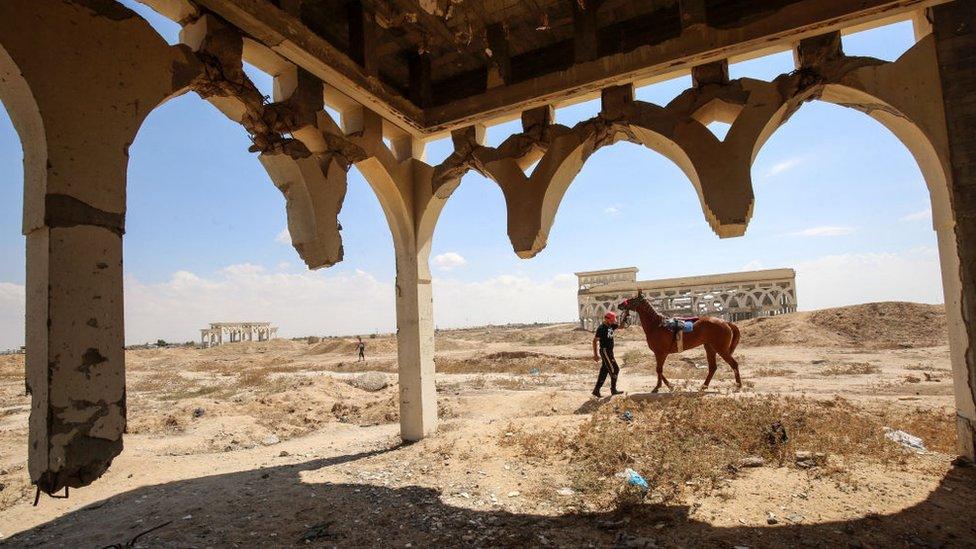
Yasser Arafat International Airport, opened after the signing of the Oslo accords, was never completed
It is the 30th anniversary of the breakthrough Oslo Accords between Israel and the Palestinians. The peace deal led to the creation of the Palestinian Authority, intended to provide interim self-government for just five years while negotiations solved outstanding core issues in the conflict. Today, nearly a decade after peace talks collapsed, the PA remains in place, but is losing its legitimacy.
With its vibrant restaurants, bustling malls and new construction constantly under way, affluent Ramallah has become synonymous with the Palestinian Authority (PA).
Since 1993 when the first of a pair of agreements known as the Oslo Accords were signed on the White House lawn, foreign donor money has flowed into this West Bank city, north of Jerusalem. Its streets contain smart government ministries with signs and stationery locating them in the State of Palestine.
But Palestinians are acutely aware that this is a facade. As far as Palestinians were concerned, the PA was supposed to be replaced with an elected government, running their own independent state in the West Bank and Gaza Strip, with its capital in East Jerusalem. That dream has become ever more distant.
"Things are bad and going backwards," Um Nabil, a middle-aged shopper in Ramallah's Manara Square tells me. "Our lives now are full of instability."
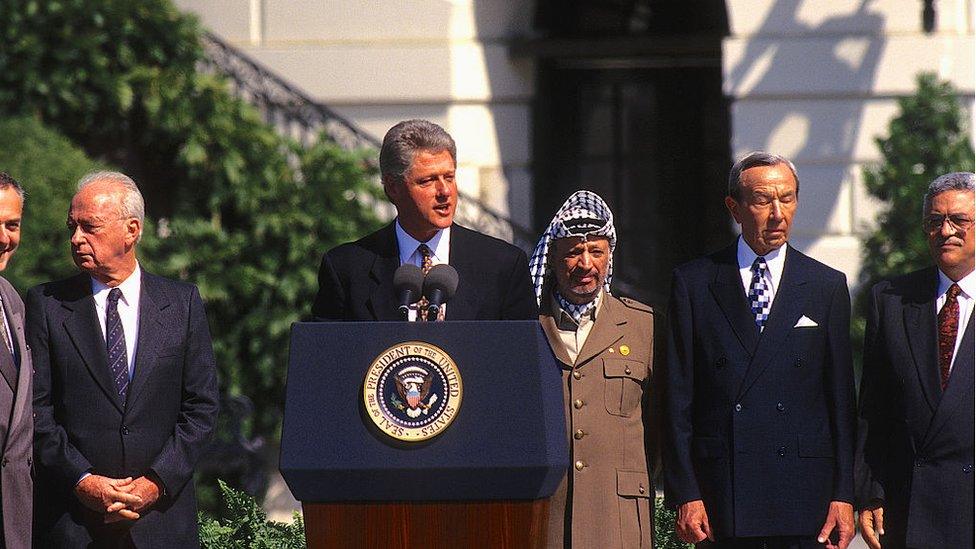
Israel PM Yitzhak Rabin and PLO leader Yasser Arafat flanked US President Bill Clinton at the signing of the accords - Mahmoud Abbas (right) was then 57
While opinion polls indicated the Oslo Accords were originally supported by two-thirds of the Palestinian public, the huge optimism it generated has been replaced by deep gloom.
"It's just an overwhelming perception that the Palestinian leadership made a huge mistake some 30 years ago," says veteran Palestinian pollster, Khalil Shikaki.
"The belief that the two-state solution is no longer viable is also overwhelming, and that is making people a lot more depressed."
The reality of life for Palestinians is a grinding military occupation. Whichever way they drive out of Ramallah, they encounter Israeli checkpoints, soldiers, and settlements.
At the time the Oslo Accord was signed in 1993, there were just over 110,000 Jewish settlers living in the West Bank, including East Jerusalem. Today, the figure is more than 700,000. Settlements are seen as illegal under international law but Israel has always disputed that.

Ramallah, a city of bustling malls and restaurants, hosts the annual Palestinian international book fair
Now the country has its most hardline ever government - with religious nationalist ministers who advocate annexation of the West Bank.
Meanwhile, the PA - dominated by the Palestinian President's Fatah faction - is weak and lacks initiatives to force Israel to stop expanding on land wanted for a future Palestinian state. It is corrupt and authoritarian and often seen as a tool of Israel's occupation.
There is huge resentment at how PA security forces co-ordinate with the Israeli army to arrest Palestinians allegedly planning attacks against Israelis. Members of the public also note that senior PA officials enjoy large salaries and VIP-style travel permits which ease Israeli restrictions on movement for them and their families. They believe that they use their status to help their allies gain access to such permits, as well as coveted public positions and contracts.
Some 60% of the Palestinian public now see the Authority as a burden, according to Dr Shikaki's surveys. Six months ago, a slim majority even said that its collapse would serve their national interest.

After Israel captured the West Bank and Gaza from Jordan and Egypt in the 1967 Middle East War, its military governors ruled the territories directly. Meanwhile, East Jerusalem was annexed to Israel in a move that was not internationally recognised.
As a result of the Oslo Accords, leaders of the Palestine Liberation Organisation (PLO) - newly recognised by Israel as the legitimate representative of the Palestinian people - returned from exile abroad. The PLO had renounced terrorism and recognised Israel's right to exist in peace.
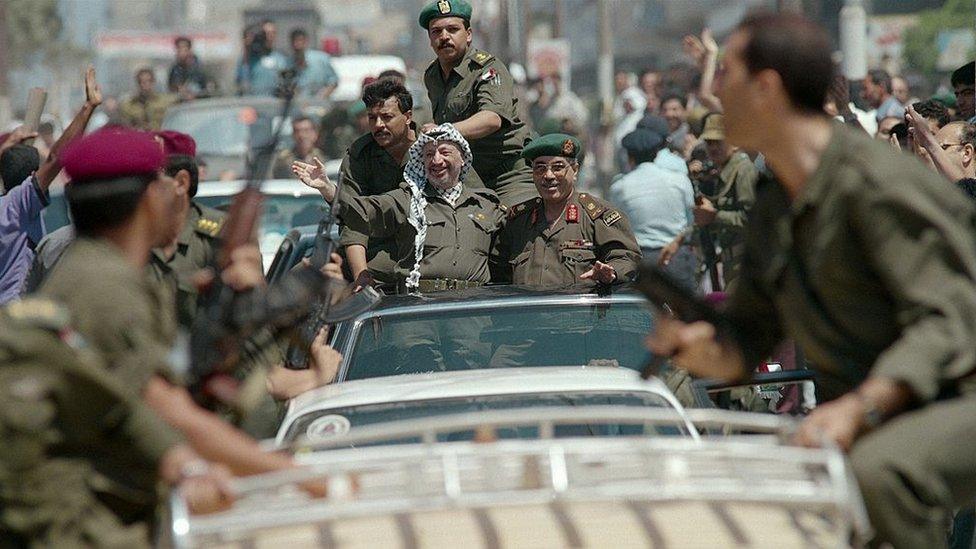
Yasser Arafat made a triumphant return from exile in July 1994
With Yasser Arafat as president, the newly created PA began to take over basic services such as health, education and policing in Gaza and parts of the West Bank. Some 60% of the West Bank remained under full Israeli control but Palestinians hoped to expand their hold over time.
It only took a few years for progress to come grinding to a halt. The collapse of peace talks at Camp David in 2000 was followed by Palestinian fury when Israel's opposition leader visited Jerusalem's most sensitive holy site - the al-Aqsa Mosque compound, known to Jews as Temple Mount - seeking to promote Israeli sovereignty there.
The deadly violence of the second Palestinian intifada, or uprising, then left the peace process in tatters and strengthened the hawkish Israeli right-wing. Although negotiations were later brokered by the US, they achieved little; the last round fell apart in 2014.
In his comfortable office in Ramallah, I meet Sabri Saidam, a former PA education minister who is now deputy secretary general of the Fatah Central Committee. He rejects the idea that the Authority is ineffective, describing its creation as "a milestone." His message is that propping it up preserves the possibility of the two-state solution - the international formula for peace.
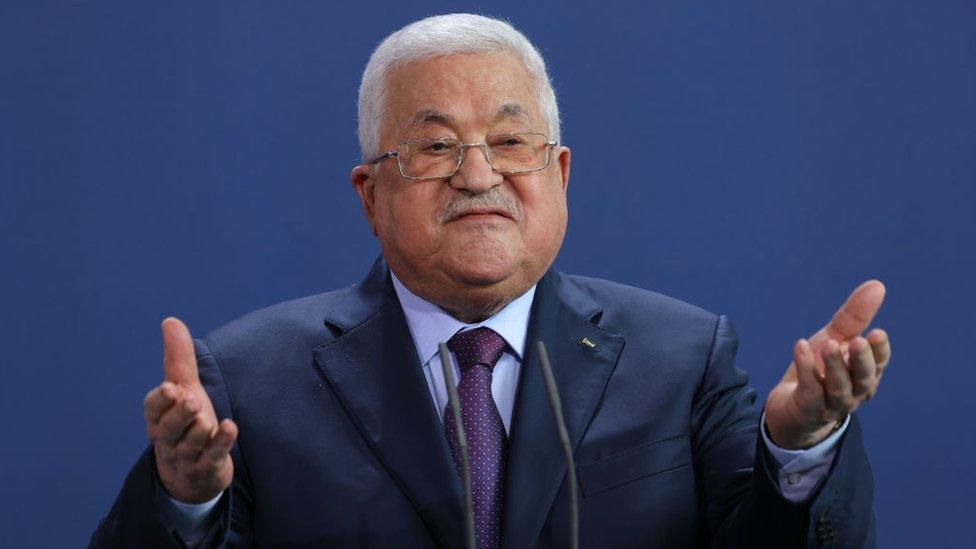
Mahmoud Abbas was elected to a four-year term in 2005 but has remained in power ever since
"It is not the finale, yet it reflects an achievement the Palestinians would like to preserve," he says, spelling out how the PA has helped consolidate a Palestinian identity, established institutions, reinforced law and order and taken on tens of thousands of public workers.
With the cash-strapped PA currently struggling to pay full salaries to employees, Dr Saidam urges crisis-weary international donors to step up, raising the spectre of chaos and collapse otherwise.

Undermining the legitimacy of the PA is its steady drift towards autocracy. Presidential elections brought Mahmoud Abbas to power for a four-year term in 2005, but now 87 years old, as the head of the PA and PLO, he continues to serve by his own decree overseeing an increasingly broken system.
The last parliamentary elections held in 2006 were won by Fatah's bitter rival, the Islamist party, Hamas, which is committed to the destruction of Israel. Efforts to form a unity government that the world could accept ultimately failed and in 2007, Hamas seized full control of Gaza, after days of deadly inter-factional fighting. It continues to rule there and the damaging internal political rift persists. Parliament remains suspended.
It's become a dictatorship and rule by those who are unelected, with no real connection to any political process
While criticising the PA - even on social media - is increasingly risky, those who do speak out argue that today it has become preoccupied with its own survival and maintaining benefits for its leaders.
"It's the opposite of self-determination and self-government," complains Diana Buttu, a Palestinian-Canadian lawyer and former spokesperson for the PLO. "It's become a dictatorship and rule by those who are unelected, with no real connection to any political process."
Today, Palestinians aged under 35 have never voted in a general election. Ms Buttu and others call for new elections and a definitive push by world powers to force Israel out of occupied territory. However, foreign players seem unwilling to take bold steps.
Back in the heart of Ramallah, the legacy of Oslo shapes the rhythms of daily life as PA workers leave their offices and pupils from government schools head home.
But people of all ages are worried. There is a looming fear of internal strife when the PA's unpopular, elderly president finally leaves the political stage without a clear successor, and then the stress of the daily news.
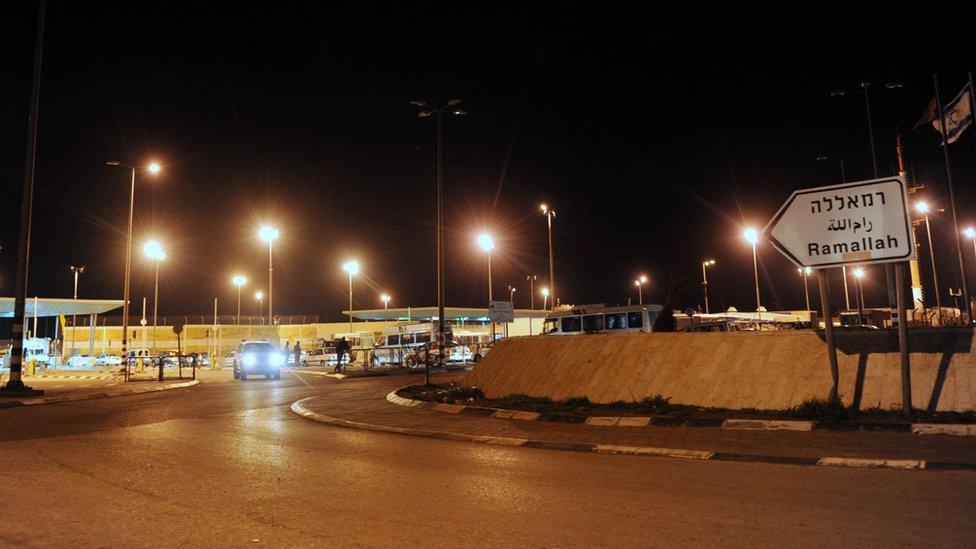
Israeli checkpoints restrict Palestinians' movement
A woman in her 20s recounts how two brothers from her village were killed on the same day by Israeli troops during an incursion late last year. "Their poor mother received the news like a thunderbolt," she says.
A shopkeeper, Abu Saleh, will not let his four sons leave the city. "I'm afraid of crossing paths with the Israeli army and settlers," he explains. He no longer visits his brother living an hour's drive away in Nablus.
Recent months have been the bloodiest in the West Bank for years with regular Israeli military raids, a series of shootings by Palestinian militants and growing violence by extremist settlers. Some pockets of the West Bank - particularly in the flashpoints of Nablus and Jenin - have fallen outside the PA's control.
The loss of faith in PA leaders has boosted militants from Hamas and Islamic Jihad still committed to armed struggle against Israel and led to the creation of new, more localised groups.
"We're so tired," sighs the young woman in Ramallah, summing up the general mood. "We just want this conflict to end." Yet three decades on from a landmark deal, there is no end in sight.
While there is real frustration at today's PA - its international role now entangled with that of the PLO - that is compounded by a sense that it also controls the only real mechanisms for any paths to progress in achieving peace.
- Published28 August 2023

- Published13 June 2023

